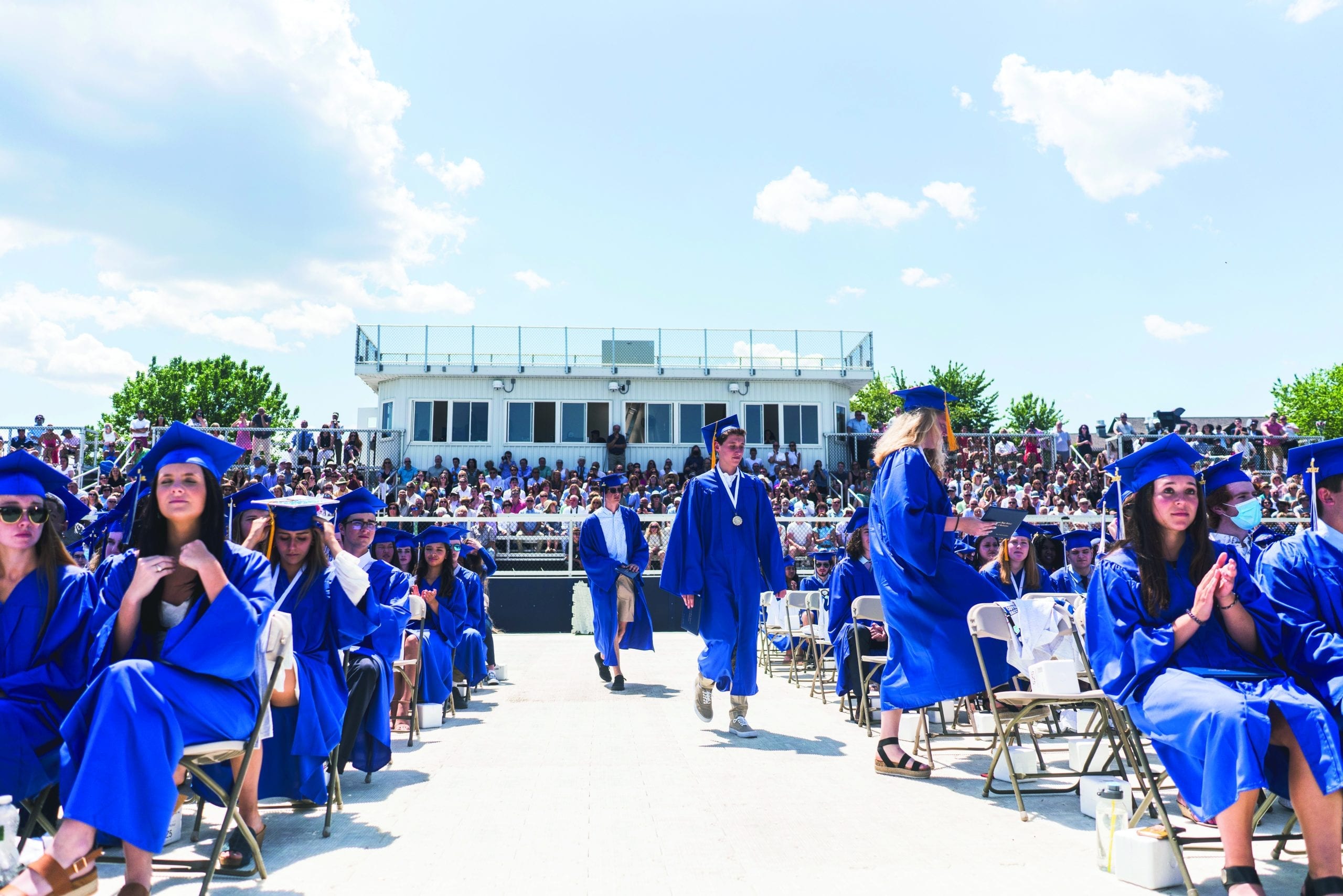SWAMPSCOTT — Swampscott High School Class President Ryan Henry told his fellow classmates at Sunday’s graduation that their collective experiences over the last four years were more than “just high school.”
A class of 183 graduates converged on Blocksidge Field to receive their diplomas and listen to Kristin O’Neill-Callahan, a 1989 graduate of the school who overcame her fears and failures to become a doctor.
However, it was members of the class who sent out the strongest message.
“Despite being ‘just high school,’ (graduating) is an accomplishment,” said Henry.
However, Henry said that in reality, “just high school” doesn’t begin to sum up the experience.
“It’s a lifetime and a blur all at once,” he said.
And, he said, so much has happened in a relatively short period of time.
“Going back to March 2020 (when the COVID-19 pandemic shutdowns began), we didn’t think we’d ever be together again. But here we are.
“High school is mostly memories,” he said. “I’d like to see what we’re all doing five years from now.”
The school had three valedictorians: Paul Flake, Mariel Fulghum and Sarah Tribendis. All of them spoke.
Fulghum said human connections are what made their high school more human, and urged her classmates to remember that.
“This school isn’t just brick and mortar,” she said. “It’s the people who make it special.”
Flake called the school year ‘”chaotic and cathartic,” and said that there was so much awkwardness at the beginning of the pandemic, “air hugs, elbow bumps,” and that now, “I’d give anything just to hug someone.”
Tribendis concluded her portion of the speech by saying that graduation is “the end of one chapter and the beginning of the next.”
O’Neill-Callahan asked the graduates to remember three things: embrace change, risk failure and use kindness.
In her case, she was convinced, once she got to Harvard, that she was on her way to becoming a Spanish teacher. That didn’t work out, and she was so distraught she wanted to leave the university.
“But my mother wouldn’t let me,” she said.
In the meantime, her closest friend was diagnosed with blood cancer, “and all of a sudden, that became my passion. I was going to learn all about it and become a doctor.”
After several tries (and defeats), she made it into medical school. She said her story is a good example of embracing change and risking failure.
The third ingredient was using kindness. And she said that never was kindness needed more than in the past year, when COVID-19 patients were isolated and alone during their illness.
“And scared,” she said. “We didn’t know anything about it. There was no testing. But what we could do was be kind to them. Hold their hands and try to reassure them.”
She even had the virus, and “while I was isolated and everything, I was the recipient of immense kindness. As Maya Angelou once said, ‘people never forget how you made them feel.'”
Superintendent of Schools Pamela Angelakis told the class that as important as it is to be intelligent and talented, being a good person is just as important, if not more. She recounted the film “Draft Day,” with Kevin Costner as the general manager of a football team who refused to take the most talented player in the draft because nobody went to the 21st birthday party he threw for himself.
“Be a person everybody wants to be around,” Angelakis said.
And, “wherever life takes you, you will always be a part of the Big Blue,” she said.
Principal Dennis Kohut paid tribute to the “tech Ninjas” in the class who helped the school with all the technology it needed to convert to remote learning during the pandemic.
And Class Secretary Katherine Strothman concluded her remarks with a quote from Dr. Seuss’ “Oh, the Places You’ll Go.”
“You have brains in your head. You have feet in your shoes. You can steer yourself any direction you choose. You’re on your own. And you know what you know. And you are the one who’ll decide where to go.”

